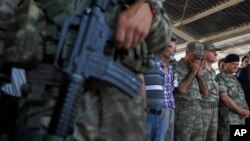Until about a week ago, the buzz around Turkey was whether a coalition government could be formed ahead of an early August deadline, precluding the president from calling for new elections.
Then, the Suruc bombing on July 20, linked to Islamic State, killed dozens of people at a rally in southern Turkey. The massacre triggered a domestic crackdown on hundreds of alleged militants that police tied to either the Islamic State or the Kurdish insurgency in Turkey.
After that, the airstrikes began.
From Friday into Saturday, Turkey's military hit positions of both the Kurdistan Workers' Party (PKK) just across the border in Iraq and Islamic State fighters in Syria. NATO and the U.S. heartily backed the new two-front air offensive.
"We stand in strong solidarity with Turkey," NATO allies said in a statement Tuesday, hours before the Turkish military announced fresh strikes on the outlawed PKK, this time in southeast Turkey. The organization condemned "terrorism in all its forms" and, like Washington, grouped the Kurdish separatists and the Islamic State as terrorists.
Coalition deal
The airstrikes come less than two weeks before Turkish lawmakers need to broker a coalition deal to keep the government running. For the first time, a Kurdish-affiliated party has a political presence in the assembly with other opposition groups and the ruling party. Parliamentary elections in June were inconclusive, giving no party the clout to rule alone.
The airstrikes "may be a temporary ploy that [President Recep Tayyip] Erdogan is using, partly for internal political purposes," said David Pollock of the Washington Institute for Near East Policy.
The attacks, according to this line of thought, could give Erdogan time to shore up support among voters; the nationalists could side with the anti-PKK efforts and those concerned about security.
"The more international emergencies ... the more that voters are likely to think we need a good, strong, stable government," said Sinan Ciddi, visiting assistant professor at Georgetown University. "It's always in Erdogan's interest to draw out the government formation process."
And if the president were to call for new elections that would override the results of voting in June, he could be creating a strong camp for the ruling Justice and Development Party (AKP), which was dealt a blow last month when it failed to earn enough seats for a majority for the first time in 13 years.
Risk for Erdogan
The Kurds in neighboring Iraq and Syria have themselves been fighting Islamic State, often successfully pushing the militant group back. In an interview with CNN this week, Turkish Prime Minister Ahmet Davutoğlu said the strikes targeted the PKK, not the Kurds in general, in a "combined fight against ... any type of terrorist activity."
The U.S. came out in robust support of the parallel strikes, with senior diplomatic officials describing the timing of the assault on the PKK as unconnected. That air raid had "nothing to do with our discussions with Turkey on the fight against [Islamic State]," a U.S. senior administration official said Tuesday.
But Fuad Omer, former head of the PKK-affiliated Kurdish Democratic Union Party (PYD) in Syria, said Ankara seized a moment to strike out at its longtime foe.
"Turkey always had plans to attack the Kurds, and now it sees it the best time to do so,” he told VOA.
American lawmakers are also among those questioning what State Department spokesman John Kirby on Monday described as a "coincidence" of the strikes on the PKK and IS.
“Turkey’s on both sides,” Democratic Representative Brad Sherman of California told VOA. “On the one hand, they are bombing ISIS. On the other hand, they are bombing forces that are fighting ISIS. So they may have felt it necessary to help us bomb ISIS so as to justify them bombing the enemies of ISIS.”
But Turkey analyst Ciddi warned that the dual airstrikes could backfire on Erdogan. The strategy pulls Turkey actively into the anti-Islamic State efforts along its hundreds of kilometers of shared border with Syria and Iraq, and it could also expose the president to the uncertainty of new elections.
"Erdogan is a big risk-taker," he said, but "this is the biggest risk he's ever taken."
VOA reporter Katherine Gypson, Pentagon correspondent Carla Babb and VOA's Kurdish service contributed to this report.




